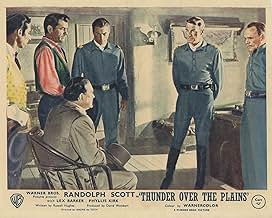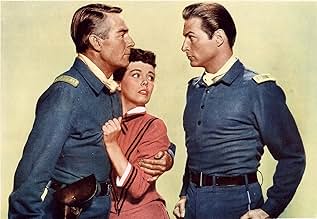In Post-Bellum Texas, an army captain tries to keep the peace between overtaxed, impoverished farmers and greedy carpetbaggers.In Post-Bellum Texas, an army captain tries to keep the peace between overtaxed, impoverished farmers and greedy carpetbaggers.In Post-Bellum Texas, an army captain tries to keep the peace between overtaxed, impoverished farmers and greedy carpetbaggers.
- Hodges' Sergeant
- (uncredited)
- Texan
- (uncredited)
- Walter Morgan
- (uncredited)
- Trooper
- (uncredited)
- Texan
- (uncredited)
- Kehoe
- (uncredited)
- Director
- Writer
- All cast & crew
- Production, box office & more at IMDbPro
Featured reviews
Randolph Scott is a Union army captain, but also a Texan and he sees both sides. Henry Hull is his put upon commanding officer and Charles McGraw plays a leader of a local gang who have risen up like Robin Hood among the oppressed. These guys aren't Ku Klux Klan nightriders by any means though.
Our villains are Hugh Sanders and Elisha Cook, Jr. a pair of scurvy lowlifes if there ever were. They've got quite the little self perpetuating racket. The more they extort, the more McGraw raids, the more Sanders and Cook cry that the army has to stay in Texas. Just about anything is blamed on McGraw and his men.
There's also a domestic crisis of sorts with newly arrived captain Lex Barker, an arrogant sort who was on duty in Washington and would like to get back there. Barker's bored and he makes a play for Phyllis Kirk who is married to Randolph Scott. Since they don't like each other from the beginning that only increases the problem.
Andre DeToth who did several westerns including a few with Randolph Scott brought home a good one here. With themes like an attempt at adultery here, this was not a western for the Saturday matinée kiddie trade. DeToth's best in my opinion is one called Ramrod with Joel McCrea and his then wife Veronica Lake, but this one is pretty good too.
DeToth also learned from the best and the final shootout scene with Scott against four men bears no small resemblance to High Noon, released a year earlier.
Definitely one of Randolph Scott's best westerns of the Fifties.
It's 1869, and Texas is still not part of the Union. Carpetbaggers rule the state and criminal activity is high. Captain Porter (Scott), a proud Texan himself, finds he has to carry out orders against his own countrymen. When a man in town is murdered in cold blood, suspicion falls on rogue cowboy Ben Westman (McGraw), but Porter believes he's innocent and strikes a deal to bring him in for a fair trial. However, this sets off a chain of events that leads to Porter himself becoming a wanted man.
Knowing direction, fine acting and a darn good script, all make Thunder Over The Plains essential viewing for the 50s Western fan. The bonus, aside from the impressive support cast, is the story itself. This was a troubled time, a time when only two states were not yet accepted back into the Union post the Civil War. Toth and Hughes paint a murky town, one of corruption, tax oppression and shifty shenanigans. There's even room in the story for strains on the family home of Porter and an attempt at adultery. Throw in the nice colour and scenery, pace it briskly with enjoyable action set-pieces (the shoot out at the end is familiar but excellently done), and it's a fictionalised winner. 7/10
The rivalry between the two captains, Scott and Barker, is an interesting feature, especially when it extends to Scott's wife (Kirk). That scene where the home-sick wife is captivated by the handsome Barker is both well played and unusual for a western. Note too how Scott is compelled by the byplay to fade into the background, another unusual feature for a western hero.
Though filmed just west of LA, the rolling scenery makes a good Technicolor backdrop to the action. Much credit for making the elements work should go to director de Toth who was skilled at handling conflict as shown in his masterwork, Ramrod (1947). The redoubtable Sam Peckinpah also selected de Toth to direct many episodes of his groundbreaking TV series The Westerner (1960).
On the whole, it's a complicated story of personal and political conflict but still delivers the goods for fans of westerns.
Scott never looks unbelievable in his part.
Lex Barker, former Tarzan and later superman "Old Shatterhand", plays against his image as arrogant villain. And I think he does it very well.
The story is entertaining and there are a lot of other good actors like Henry Hull, Phyllis Kirk and Elisha Cook jr. in it.
This really is an enjoyable B-western directed by veteran Andre de Toth.
Did you know
- GoofsGrowing cotton and transporting cotton bales thru the hilly countryside was a foolish director's scheme. In 1869 cotton wasn't grown within 1,000 miles of this area.
- Quotes
Norah Porter: Whatever became of Frances Bilky?
Captain Bill Hodges: I don't know. She married a colonel, I think. Maybe it was a general. At any rate, she outranks all of us.
Norah Porter: But that's wonderful! Now she'll have her lifelong ambition to lead the cotillion. Well, I guess that's what I always wanted too.
Captain Bill Hodges: You don't have anything like that around here, do you, Captain?
Captain David Porter: Oh, I don't know. The Indians come down once a month and dance for us.
- ConnectionsReferenced in Les hommes de Las Vegas (1968)
- How long is Thunder Over the Plains?Powered by Alexa
Details
- Runtime
- 1h 22m(82 min)
- Aspect ratio
- 1.37 : 1

























